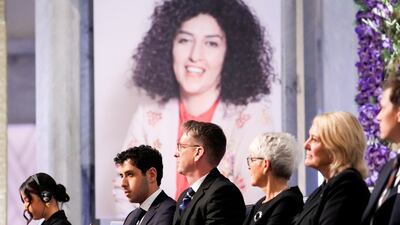Jailed Iranian Nobel laureate Narges Mohammadi faces a new trial and risks being transferred out of Tehran to a new prison to serve an eventual sentence, her family has said.
The trial, which was scheduled to begin at a revolutionary court in Tehran on Tuesday, is the first against Ms Mohammadi since her family accepted the 2023 Peace Prize on her behalf in Oslo on December 10.
The charges were not immediately clear but are believed to be related to her activities behind bars in Tehran's Evin prison where she has campaigned against Iran's Islamic authorities and the mandatory wearing of a headscarf, or hijab, for women.
“The first trial of Narges Mohammadi, after receiving the Nobel Peace Prize, will be held at 10am on December 19 in branch 26 of the revolutionary court,” her family said on Monday.
If convicted, she could be told to serve her sentence in a prison outside the Iranian capital, the family said.
“It was announced that due to political and security issues, the execution of the sentence would take place outside Tehran,” the family said, adding that the request for this had come from the Intelligence Ministry.
Ms Mohammadi, 51, has spent much of the past two decades in and out of jail. She began serving her most recent sentence in November 2021.
The family said this will be the third trial Ms Mohammadi has faced related to her activities in prison.
In the two previous cases, she was sentenced to 27 months in prison and four months of street sweeping and social work.
During the past two decades, Ms Mohammadi has been arrested 13 times and sentenced five times to a total of 31 years in prison and 154 lashes.
The family confirmed that Ms Mohammadi, who has not seen her Paris-based husband and children for several years, remains deprived of the right to make phone calls.
She has not spoken to her twin 17-year-old children, who accepted the Nobel prize on her behalf, for almost two years.
But until now, she had been able to speak to certain family members inside Iran, ensuring her messages could rapidly reach the outside world via her social media accounts.
“Since November 29, prison authorities have also informed her of the termination of telephone calls and visits,” the family said.
In her Nobel acceptance speech read by her children, Ms Mohammadi denounced a “tyrannical and anti-women religious” government in Iran, and predicted that Iranians would “dismantle obstruction and despotism through their persistence”.

